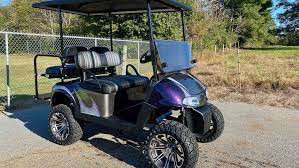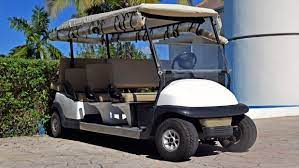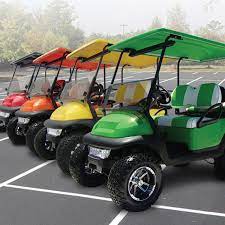Golf Carts Franchise In SC : 5 Exciting Opportunities

The allure of Golf Carts Franchise In SC South Carolina (SC) extends beyond the greens, shaping a unique franchise landscape in the state. As an integral part of leisure and transportation, golf carts offer lucrative business opportunities for entrepreneurs. In this article, we delve into the dynamics of the Golf Carts Franchise Industry in SC, exploring its significance, market trends, and the pathway to successful franchise ownership. Whether you’re a prospective franchisee or an enthusiast, uncover the essentials of navigating this thriving sector in the Palmetto State.
Introduction to Golf Carts Franchise In SC Industry

The golf carts franchise industry in South Carolina (SC) is a dynamic sector that goes beyond the boundaries of golf courses, becoming an integral part of recreational and utility transportation. With their eco-friendly nature and versatility, golf carts have evolved into popular modes of transportation in various settings, such as residential communities, resorts, and commercial establishments. This section provides a brief overview of the industry’s evolution and outlines the key factors contributing to its significance in the Palmetto State.
Evolution of the Golf Carts Industry:
From Golf Courses to Everyday Transportation:
The inception of golf carts can be traced back to their use as utility vehicles on golf courses. However, their adaptability and efficiency led to a broader application, transforming them into convenient and eco-friendly modes of transportation in non-golf settings.
Increasing Popularity in Diverse Settings:
Beyond the fairways, golf carts have gained popularity in residential communities, resorts, theme parks, and industrial facilities. Their quiet operation, low maintenance costs, and environmental friendliness contribute to their widespread adoption.
Significance in South Carolina:
Lifestyle Integration:
In SC, golf carts seamlessly integrate into the lifestyle of communities and establishments. Their use extends to neighborhood transportation, recreational activities, and even daily commuting within designated areas.
Economic Impact:
The golf carts industry plays a vital role in the state’s economy, offering business opportunities, generating employment, and contributing to the tourism sector. The demand for golf carts and related services creates a dynamic market with room for entrepreneurial ventures.
Key Considerations for Franchisees:
Niche Market Potential:
The diverse applications of golf carts create niche markets, providing franchisees with opportunities to cater to specific customer needs. Understanding these niches is crucial for prospective franchise owners.
Sustainable Business Model:
As consumers increasingly prioritize sustainability, the eco-friendly nature of golf carts positions franchises favorably. Franchisees can leverage this aspect to align with environmental consciousness and meet the evolving preferences of customers.
Understanding Franchising
Franchising serves as a prominent business model in the golf carts industry, offering entrepreneurs a structured approach to business ownership and expansion. This section elucidates the concept of franchising, highlighting its advantages, disadvantages, and relevance within the context of the golf carts franchise industry in South Carolina (SC).
Definition of Franchising:
Franchising entails a contractual relationship between a franchisor (the parent company) and a franchisee (the independent business owner). The franchisor grants the franchisee the rights to operate a business under its established brand, providing access to proven business models, operational support, and marketing resources.
Advantages of Franchising:
Established Brand Recognition:
Franchisees benefit from the established reputation and brand recognition of the franchisor, leveraging consumer trust and loyalty to drive sales and customer engagement.
Proven Business Model:
Franchise systems come with pre-established business models, operational procedures, and marketing strategies that have been tested and refined over time. This reduces the risk associated with starting a new venture from scratch.
Ongoing Support and Training:
Franchisors typically offer comprehensive training programs, operational support, and marketing assistance to franchisees. This support ensures that franchisees receive the necessary guidance and resources to succeed in their business endeavors.
Access to Supply Chains and Economies of Scale:
Franchisees often benefit from the purchasing power and economies of scale of the franchisor’s supply chain network, allowing them to procure goods and services at competitive prices and streamline their operations.
Disadvantages of Franchising:
Initial Investment and Royalty Fees:
Franchise ownership entails significant upfront investment costs, including franchise fees, royalties, and other ongoing expenses associated with operating under the franchisor’s brand.
Limited Autonomy:
While franchisees benefit from the support and guidance of the franchisor, they may have limited autonomy in decision-making and business operations. Franchise agreements often stipulate strict adherence to franchisor protocols and standards.
Dependence on Franchisor’s Success:
The success of a franchisee’s business is closely tied to the overall performance and reputation of the franchisor. Negative publicity or operational issues at the franchisor level can impact the success of individual franchise units.
Relevance in the Golf Carts Franchise Industry:
Franchising plays a pivotal role in the golf carts industry, offering aspiring entrepreneurs an opportunity to enter the market with the backing of established brands and proven business models. In SC, franchising provides a pathway to entrepreneurship within a regulated and structured framework, enabling franchisees to capitalize on the growing demand for golf carts and related services.
Market Analysis of Golf Carts in South Carolina
Understanding the market dynamics of golf carts in South Carolina (SC) is essential for prospective franchisees aiming to capitalize on opportunities in the industry. This section conducts a comprehensive analysis of the market trends, demand drivers, and competitive landscape shaping the golf carts sector in SC.
Current Market Trends for Golf Carts Franchise In SC :
Growth in Recreational and Utility Applications:
The demand for golf carts in SC is not limited to golf courses but extends to various recreational and utility applications. From residential communities to resorts and industrial facilities, golf carts serve as convenient and eco-friendly modes of transportation.
Customization and Personalization:
Consumers increasingly seek personalized and customized golf carts that reflect their individual preferences and lifestyle choices. Customization options range from aesthetic enhancements to functional features, catering to diverse consumer preferences.
Demand Drivers:
Tourism and Hospitality Sector:
SC’s vibrant tourism and hospitality sector contribute to the steady demand for golf carts in resort communities, theme parks, and recreational facilities. Golf carts serve as efficient transportation options for guests and visitors, enhancing their overall experience.
Urban and Residential Developments:
The proliferation of urban and residential developments in SC fuels the demand for golf carts as alternative modes of transportation within gated communities and planned neighborhoods. Golf carts offer residents a convenient and environmentally sustainable means of getting around.
Competitor Analysis:

Established Brands and Dealerships:
The golf carts market in SC is characterized by the presence of established brands and dealerships offering a wide range of products and services. Competitors include both national brands and local dealerships catering to specific regional markets.
Innovation and Technology:
Competitors in the golf carts industry continuously innovate to differentiate their products and services. Technological advancements, such as electric-powered carts and integrated GPS systems, contribute to market differentiation and competitive advantage.
Regional Variances:
Coastal vs. Inland Markets:
The demand for golf carts may vary between coastal and inland regions of SC based on factors such as population density, tourism activity, and lifestyle preferences. Coastal areas may experience higher demand during peak tourist seasons.
Urban vs. Rural Settings:
Urban centers and densely populated areas may exhibit higher demand for golf carts due to traffic congestion and limited parking options, while rural settings may prioritize utility applications such as agricultural and industrial use.
Future Outlook:
Sustainable Growth Opportunities:
The golf carts market in SC is poised for sustainable growth driven by factors such as urbanization, environmental consciousness, and technological innovation. Franchisees can capitalize on these opportunities by offering innovative products and services tailored to evolving consumer preferences.
Regulatory and Environmental Considerations:
The industry’s future outlook is also influenced by regulatory and environmental factors, including emissions standards, safety regulations, and land-use policies. Franchisees must stay abreast of regulatory changes and industry trends to adapt and thrive in the competitive landscape.
Franchise Opportunities in South Carolina
Franchising offers a compelling avenue for entrepreneurs looking to enter the golf carts industry in South Carolina (SC). This section explores the diverse franchise opportunities available in SC, providing insights into the range of options, requirements, and qualifications for prospective franchisees.
Available Franchise Options:
National Franchise Brands:
National franchise brands in the golf carts industry offer franchise opportunities with established brand recognition, comprehensive support systems, and proven business models. Franchisees can leverage the reputation and resources of these brands to establish successful ventures in SC.
Regional and Local Dealerships:
Regional and local dealerships represent another avenue for franchise ownership in SC. These dealerships may offer greater flexibility and customization options tailored to local market preferences, providing franchisees with opportunities for niche positioning and market differentiation.
Requirements and Qualifications:
Financial Considerations:
Prospective franchisees must assess their financial readiness to invest in a golf carts franchise in SC. Initial investment requirements may vary depending on the franchise brand, location, and business model. Franchise fees, royalty payments, and startup costs should be carefully evaluated.
Business Experience and Management Skills:
While prior experience in the golf carts industry is beneficial, many franchise opportunities in SC do not require specific industry expertise. However, strong business acumen, leadership skills, and a customer-centric approach are essential qualities for franchise ownership.
Compliance with Franchisor Standards:
Franchisees must adhere to the operational standards, protocols, and brand guidelines established by the franchisor. This includes maintaining product quality, customer service standards, and adherence to contractual agreements outlined in the franchise agreement.
Benefits of Franchise Ownership:
Established Brand Recognition:
Franchise ownership provides access to established brand recognition and consumer trust, reducing the time and resources required to build brand awareness from scratch. Franchisees benefit from the reputation and credibility associated with the franchisor’s brand.
Training and Support:
Franchisors offer comprehensive training programs, operational support, and ongoing guidance to franchisees throughout the lifecycle of the business. Training may cover areas such as sales and marketing, product knowledge, and operational procedures, equipping franchisees with the necessary skills and knowledge to succeed.
Access to Marketing Resources:
Franchisees gain access to marketing resources, advertising materials, and promotional campaigns developed by the franchisor. This support helps franchisees effectively market their products and services, attract customers, and drive sales in the competitive SC market.
Evaluating Franchise Opportunities:
Franchise Disclosure Document (FDD) Review:
Prospective franchisees should conduct a thorough review of the Franchise Disclosure Document (FDD) provided by the franchisor. The FDD contains essential information about the franchise system, including financial performance, legal obligations, and franchisor-franchisee relationships.
Due Diligence and Research:
Franchisees should conduct due diligence and research to evaluate the viability of franchise opportunities in SC. This may involve visiting existing franchise locations, speaking with current franchisees, and assessing market demand and competition in the region.
Legal and Regulatory Considerations
Operating a golf carts franchise in South Carolina (SC) entails compliance with a variety of legal and regulatory requirements. This section explores the licensing, permits, and regulatory considerations that franchisees must navigate to ensure lawful and successful operations within the state.
Licensing and Permit Requirements:
Business License:
Franchisees must obtain a business license from the appropriate municipal or county authorities in SC to legally operate their golf carts franchise. The specific requirements and application procedures may vary depending on the location of the franchise.
Sales Tax License:
Franchisees selling golf carts and related products in SC are required to obtain a sales tax license from the South Carolina Department of Revenue. This license allows the collection and remittance of sales taxes on taxable goods and services.
Compliance with State and Local Regulations:
Zoning and Land Use Regulations:
Franchisees must comply with zoning and land use regulations governing the operation of golf cart businesses in SC. These regulations may dictate permissible locations for operating golf cart rental services, sales, and maintenance facilities.
Safety and Operating Standards:
Golf carts in SC are subject to safety and operating standards outlined by state and local authorities. Franchisees must ensure that their vehicles meet safety requirements, including proper lighting, signaling devices, and seating capacity.
Environmental Regulations:
Emissions Standards:
Electric and gas-powered golf carts may be subject to emissions standards enforced by state and federal environmental agencies. Franchisees must ensure compliance with emissions regulations and maintain environmentally sustainable practices.
Disposal of Batteries and Hazardous Materials:
Franchisees operating electric golf carts must adhere to regulations governing the disposal of batteries and hazardous materials. Proper disposal methods and recycling practices help minimize environmental impact and ensure regulatory compliance.
Insurance Coverage:
Liability Insurance:
Franchisees are typically required to maintain liability insurance coverage to protect against potential accidents, injuries, and property damage associated with the operation of golf carts. Adequate insurance coverage helps mitigate financial risks and liabilities.
Property Insurance:
Franchisees may also opt to obtain property insurance coverage to safeguard against losses or damages to inventory, equipment, and facilities. Property insurance provides financial protection in the event of theft, vandalism, or natural disasters.
Legal Documentation and Contracts:
Franchise Agreement:
Franchisees enter into a legally binding franchise agreement with the franchisor, outlining the terms, conditions, and obligations of the franchise relationship. It is essential for franchisees to review the agreement carefully and seek legal counsel if necessary.
Lease Agreements:
Franchisees leasing commercial space for their golf carts business must negotiate and execute lease agreements with landlords or property owners. Lease agreements typically address rent payments, lease terms, and tenant responsibilities.
Financial Considerations for Franchisees
Operating a golf carts franchise in South Carolina (SC) requires careful financial planning and management to ensure long-term viability and success. This section explores the financial aspects of franchise ownership, including initial investment, ongoing expenses, revenue projections, and profitability considerations.
Initial Investment and Startup Costs:
Franchise Fee:
Franchisees typically pay an initial franchise fee to the franchisor for the rights to operate under the brand name and utilize the franchise system. The franchise fee may vary depending on the brand, market demand, and territory exclusivity.
Equipment and Inventory:
Franchisees must invest in golf carts, accessories, and inventory to meet customer demand and operational requirements. The cost of equipment and inventory varies based on the size and scale of the franchise operation.
Facility and Leasehold Improvements:
Franchisees leasing or purchasing commercial space for their golf carts business incur costs associated with leasehold improvements, renovations, and facility setup. Expenses may include interior/exterior renovations, signage, and equipment installation.
Ongoing Expenses:
Royalty and Advertising Fees:
Franchisees are typically required to pay ongoing royalty fees to the franchisor, usually calculated as a percentage of gross sales. Additionally, franchisees may contribute to national or regional advertising funds to support marketing initiatives and brand promotion.
Operational Costs:
Franchisees incur ongoing operational expenses related to employee salaries, utilities, insurance premiums, maintenance, and repairs. It is essential to budget for these recurring expenses to maintain smooth business operations.
Marketing and Promotional Expenses:
Franchisees allocate funds for local marketing campaigns, promotional activities, and community outreach efforts to attract customers and drive sales. Strategic marketing investments help build brand awareness and foster customer loyalty.
Revenue Projections and Profitability:
Market Analysis and Demand Forecasting:
Franchisees conduct market analysis and demand forecasting to estimate potential revenue streams and market share within the SC golf carts industry. Understanding customer preferences, competitive dynamics, and seasonal trends informs revenue projections.
Pricing Strategies and Profit Margins:
Franchisees develop pricing strategies based on factors such as product costs, market competition, and perceived value. Maintaining competitive pricing while ensuring sufficient profit margins is essential for long-term profitability.
Financial Performance Monitoring:
Franchisees monitor key financial metrics, including sales revenue, gross profit, operating expenses, and net income, to assess business performance and identify areas for improvement. Regular financial analysis informs strategic decision-making and resource allocation.
Golf Carts Franchise In SC Financing Options:

Self-Funding:
Some franchisees use personal savings, investments, or retirement funds to finance their golf carts franchise venture. Self-funding offers autonomy and avoids debt obligations but requires significant upfront capital.
Small Business Loans:
Franchisees may explore financing options through small business loans, lines of credit, or equipment financing programs offered by banks, credit unions, or Small Business Administration (SBA) lenders. Loans provide access to capital for startup costs and working capital needs.
Franchisor Financing Programs:
Some franchisors offer financing assistance or incentive programs to support franchisees in securing financing for initial investment and startup costs. Franchisee financing programs may include deferred payments, reduced franchise fees, or financing partnerships with lending institutions.
Golf Carts Franchise In SC Conclusion
In conclusion, establishing and operating a golf carts franchise in South Carolina presents both opportunities and challenges for aspiring entrepreneurs.
Through thorough market analysis, understanding of legal and regulatory requirements, and careful financial planning, franchisees can position themselves for success in this dynamic industry.
By leveraging established brand recognition, providing exceptional customer service, and adapting to evolving market trends, franchisees can carve out a niche in the competitive landscape of SC’s golf carts market.
Moreover, adherence to ethical business practices, continuous learning, and commitment to innovation are integral to long-term sustainability and growth.
As the industry evolves and consumer preferences shift, franchisees must remain agile and responsive to emerging opportunities and challenges. With dedication, strategic vision, and a passion for excellence, golf carts franchisees can build thriving businesses that contribute to the vibrant economic landscape of South Carolina.


